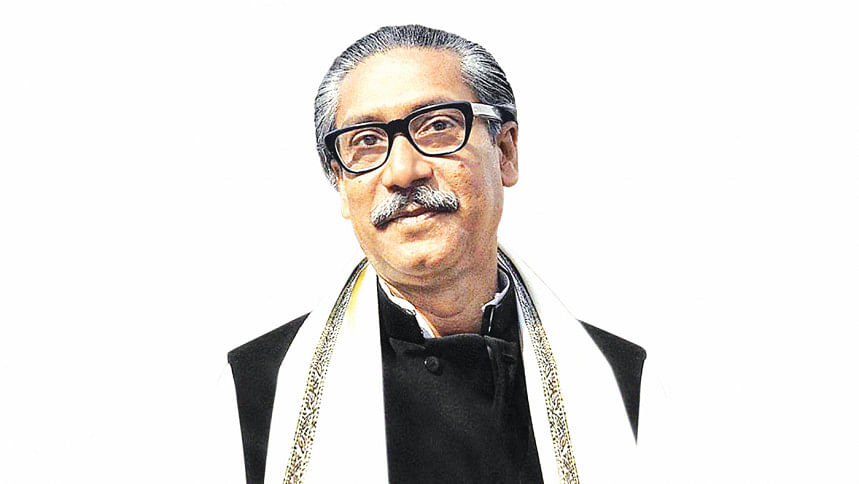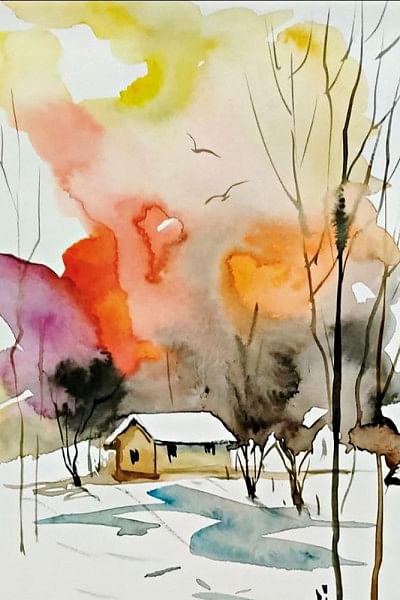Bangabandhu’s speech at the national literature conference in Bangla Academy

Father of the Nation Bangabandhu Sheikh Mujibur Rahman delivered the speech while inaugurating the first ever national literature conference in post-independence Bangladesh organised by Bangla Academy on its premises on 14 February 1974. Bangabandhu recollects the leadership role he assumed in 1948 when it began and then again in 1952 when he was put behind bars by the autocratic Pakistani regime. He emphasises how central cultural emancipation is to nation-rebuilding as it can elevate people morally and instil the right values among people. He then urges on the enlightened section of society consisting of litterateurs, intellectuals, artists and cultural personalities to fulfil their obligations for the cultural emancipation of Bangladesh.--Translator
Honourable president [of Bangla Academy], president of the reception committee, guests from abroad, representatives from the diplomatic corps and the respected audience,
To build a nation properly, revolutionary changes need to be made in our thinking and consciousness just as more development activities are needed in industries, agriculture, transportation and all other sectors.
This national literature conference has been organised to commemorate the 21st February – a day knotted with memories of the sacred Language Movement. At the outset I pay my respect to the eternal memories of those who accepted martyrdom during the Language Movement of 21st February. Standing before you reverentially, I also recall those who sacrificed themselves for the freedom and emancipation of Bangladesh.
My friends,
All sorts of memories pervade my mind when I recall the immortal 21st February. The Bangla Academy premises on which you've organised the literature conference carries everlasting evidence of the ebb and flow of the struggle of the indomitable people of this country for their mother tongue. Our movement for Bengali started on 11 March 1948. The tyrannical regime of that period resorted to inhuman assaults to silence our demand on behalf of our mother tongue. Hundreds of students and people were injured by the use of tear gas and lathi charges. On that very morning, I too was arrested along with my co-workers from a protest rally and procession. They started torturing and imprisoning us. But no power could ever deviate us from the path of truth. Anyway, then came the bloody day of Phalgun [the 11th month in the Bengali calendar year] of '52. I was in prison then. I was shifted to Medical College Hospital from prison for treatment. From Medical College Hospital, with the help of police sub-inspector Manik Miah, I managed to keep in touch with all members of the Sarbadaliya Sangram Parishad [All Party Agitation Council]. They decided to stage a movement on the 21st February after conferring with me. And I went on a fast unto death from 16 February after discussing the situation with them. I continued that hunger-strike till 27 February. My friends from those days can perhaps recall these events even today. Our movement of that period was successful. Having waded through the bloody path of 21st February, the Bengali nationalist movement and the spirit of self-rule gained further momentum.

Artists, writers and cultural personalities have organised the national literature conference for the first time after independence under the aegis of Bangla Academy. Needless to say, this great initiative is a timely one. Due to years of oppression and deprivation, we're hungry, economically impoverished, and troubled with countless problems. We're involved in a struggle for economic emancipation and nation-building to overcome our problems. But we aren't poor when it comes to literature, culture and tradition. Our language has a two-thousand year old glorious history. Our literature is rich. Our culture is radiant with its unique features. To stand with our heads held high in the world, we must establish the prestige of our language, literature, culture and tradition abroad.
My dear friends,
I know that in every stage of our struggle for emancipation, artists, litterateurs and cultural activists of the country have played active roles in tandem with political workers, hardworking people, farmers, labourers, students and the youth; endured torture and shed their blood. Among independent nations around the world, we can be proud of the fact that our political and cultural struggle advanced simultaneously during our fight for freedom. As the country is independent today, I have high hopes of what our writers, artists and cultural personalities can do. Those who are pursuing art and literature, and serving our tradition and culture, will have to move ahead, keeping close contact with the people of our country. Our people's thoughts, joys and sorrows — their lives — have to be presented through our literature and in our art. In literature, we must showcase the tales of joy and sorrow of the distressed people of this country. We must utilise literature and art for their welfare. Unmask the corruption through your writings which has found its way into every part of the country. Support the government in its bid to uproot corruption. I'm neither a writer nor an artist but I believe people are the ultimate source of all literature and art. No noble literary work or great art can ever be created if it distances itself from people. I've struggled my whole life with people. Whatever I'll do in the future, I'll do with them.
Dear friends,
My appeal to you is this– ensure that our literary and cultural endeavours aren't confined to city mansions. The heart and spirit of millions from rural Bangladesh must be reflected in it. I'll be most delighted if all these are valued properly in today's literature conference.
Dear guests,
Problems have no end in this war-ridden country. We've financial constraints and face unbearable deprivation in many sectors. Yet I think that a lack of values is the most serious of all. We must immediately put the brakes on the crises in our national life caused by this dearth of values. I believe the writers, artists, cultural personalities, educationists and intellectuals can play a vital role in overcoming this catastrophic situation by reviving values and developing benevolence. Now the time has come for self-criticism and for them to see how sincerely they have fulfilled their duties and played their part for the welfare of the country. The nation and the country makes this demand on them today.
To build a nation properly, revolutionary changes need to be made in our thinking and consciousness just as more development activities are needed in industries, agriculture, transportation and all other sectors. I say this everywhere - we need golden human beings to build a golden Bengal. Such golden human beings won't fall down from the sky or come out of the crevice of earth. We need to create them out of the 75 million people of this Bengal. Through fostering new ideas, creative thinking and the right values, the creation of such new human beings can take place. Thoughtful writers, artists, educationists, intellectuals and cultural personalities are the skilled architects of manavatma [human soul]. Today, at this literature conference, I urge you to dedicate yourself to creating golden human beings. I sincerely convey my well-wishes to the guests from our friendly states who have joined us in this conference and people from different corners of the country who have gathered here. I wish this conference a great success and declare it to be formally open.
Joi Bangla.
Source: Majid, Pias. Muktijuddha Bangabandhu O Bangla Academy (The Liberation War, Bangabandhu and Bangla Academy). Bangla Academy, 2020, pp. 56-8.
Ahmed Ahsauzzaman is professor of English and Modern Languages at Independent University, Bangladesh (IUB). He was an editorial board member of the book Father of the Nation Bangabandhu Sheikh Mujibur Rahman: Birth Centenary Volume (2021) edited by the Honourable Prime Minister Sheikh Hasina.

 For all latest news, follow The Daily Star's Google News channel.
For all latest news, follow The Daily Star's Google News channel. 



Comments